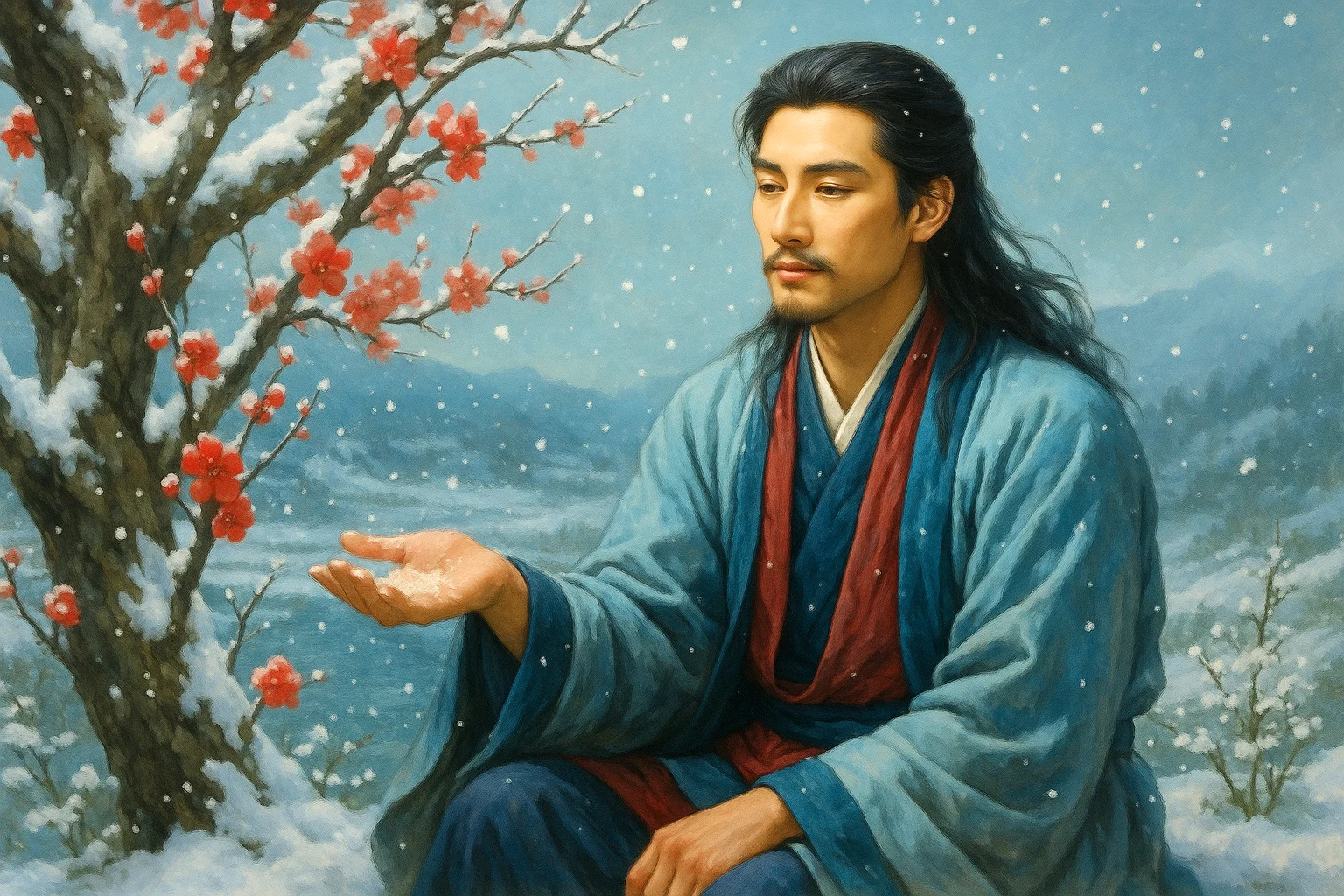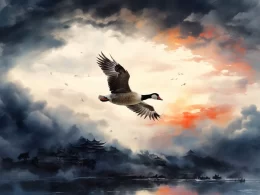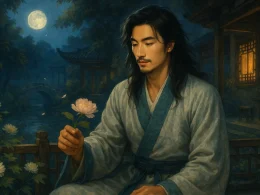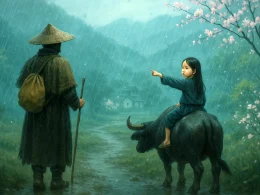My new lyrics in sweetest measure flow,
While Crimson softly sings as my flute hums low.
The song ends - we've passed Pine-Mound's long way,
Turning to see fourteen bridges melt in mist's sway.
Original Poem
「过垂虹」
姜夔
自作新词韵最娇,小红低唱我吹箫。
曲终过尽松陵路,回首烟波十四桥。
Interpretation
Composed on New Year's Eve of 1191 during Emperor Guangzong's reign, this heptasyllabic quatrain captures Jiang Kui's journey from Fan Chengda's Stone Lake villa in Suzhou back to Huzhou. Accompanied by the singer "Xiaohong," the poet passed the famed Rainbow Bridge (垂虹桥) in Wu River County, still elated from having just completed his twin masterpieces "Fragrant Shadows" and "Sparse Shadows." The poem crystallizes this euphoric moment of artistic triumph.
First Couplet: "自作新词韵最娇,小红低唱我吹箫。"
Zì zuò xīn cí yùn zuì jiāo, Xiǎo Hóng dī chàng wǒ chuī xiāo.
My freshly penned lyrics pulse with tender tone,
While Xiaohong hums soft as I pipe alone.
The opening couplet showcases the poet's synesthetic artistry—where musicality and verse intertwine. His pride in "freshly penned lyrics" (新词) reflects particular satisfaction with his twin compositions. "Xiaohong hums soft" (小红低唱) embodies aesthetic harmony between beauty and music, while "pipe alone" (我吹箫) reveals his immersive joy in this creative symbiosis.
Second Couplet: "曲终过尽松陵路,回首烟波十四桥。"
Qǔ zhōng guò jìn Sōnglíng lù, huí shǒu yān bō shí sì qiáo.
The song ends—we've passed Songling's waterways,
Fourteen bridges dissolve in misty haze.
The conclusion pivots to temporal and spatial transcendence. Unaware of distance during musical rapture, the poet only notices their progress upon the song's end. "Fourteen bridges dissolve" (十四桥) merges the concrete (bridges of Wu River) with the ethereal (art's power to transport), leaving the reader—like the poet—gazing back at a reality now transformed by beauty.
Holistic Appreciation
Though just four lines long, this poem unfolds like an animated ink-wash painting of Jiangnan, or a delicate frame from a classical animation. With minimalist strokes, it captures an exquisite scene of "painted bridges, flowing water, flute songs fading into the distance": a bright-voiced songstress hums fresh lyrics, the poet accompanies her with his flute, and a small boat glides past stone arch after stone arch. Here, humanity and nature, sound and scenery, water and emotion all dissolve into a tranquil yet flowing poetic tableau.
The first two lines express the poet's unguarded delight, while the latter two turn contemplative, embedding deeper reflections within the landscape. Light in imagery yet profound in meaning, the poem lingers with a quiet resonance. The closing line—"I turn to see fourteen bridges veiled in mist"—conveys, with subtle mastery, the fleeting nature of joy and the dreamlike passage of time, leaving the reader with a wistful afterglow.
Artistic Merits
Written in the disciplined seven-character quatrain form, the poem balances crystalline clarity with lyrical fluidity. The poet seamlessly blends emotion, scenery, and music, making each verse unfold like a musical phrase—its cadences naturally composing a visual symphony. The opening line, "These new lyrics of mine hold the sweetest tune," carries understated pride, while "my little Red murmuring as I play the flute" pairs motion and stillness into an audiovisual harmony. Place-references like "Songling," "mist-wreathed waves," and "fourteen bridges" further suffuse the poem with the ethereal atmosphere of Jiangnan's waterways.
True to Jiang Kui's signature style, the poem embodies "painting within verse" and "music within imagery." Though grounded in real moments, its interplay of concrete and abstract reveals quiet meditations on transience, achieving a tone that is serene yet tender, refined yet deeply felt.
Insights
Though depicting just a fleeting scene—a song, a journey—the poem reflects the poet's profound insights into art, life, and ephemeral beauty. His self-assured voice celebrates the grace of creative companionship, while the mist-shrouded bridges hint at a quiet awareness of time's passage. Beyond appreciating its painterly rhythm and musicality, we might embrace its philosophy: to navigate life's waterways with poise and presence, carrying an inner elegance that allows us to look back, unburdened, at the vistas we leave behind.
About the poet

Jiang Kui (姜夔, c. 1155 - 1221), a native of Poyang, Jiangxi, was a Southern Song Dynasty lyric poet and musician. He remained a commoner throughout his life. His lyrics are known for their ethereal and austere style, and his poetry is also highly regarded. Along with Fan Chengda and Yang Wanli, he is celebrated as one of the "Four Great Masters of the Restoration."












